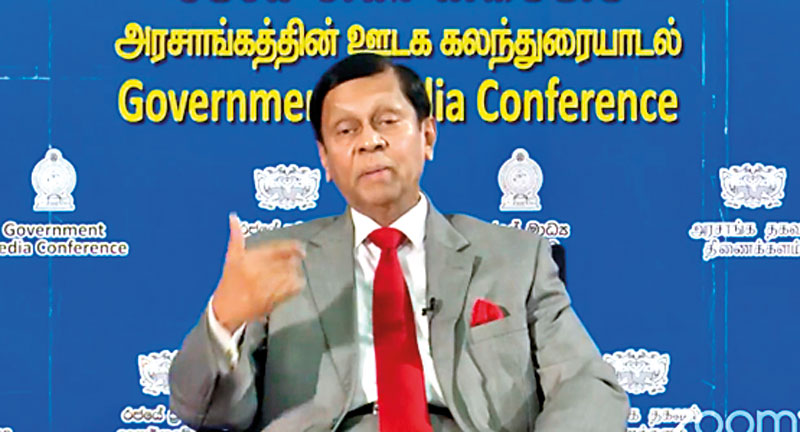Tuesday Feb 17, 2026
Tuesday Feb 17, 2026
Thursday, 13 January 2022 03:14 - - {{hitsCtrl.values.hits}}

Central Bank Governor Nivard Cabraal
Central Bank Governor Nivard Cabraal yesterday came down hard on those calling for default, insisting that the Central Bank has been on a difficult yet sure path of boosting reserves for debt repayment including an ongoing exercise of restructuring and rescheduling to ensure currency stability whilst meeting essential imports of the country.
“Default as some business leaders and ‘internet economists’ want will be disastrous and lead to anarchy,” Cabraal told journalists, adding that their motive is questionable when the Government has already made arrangements to settle the $ 500 million International Sovereign Bonds (ISBs) maturing on 18 January.
Noting that Sri Lanka had been successful in servicing maturing ISBs to the tune of $ 2 billion in the past two years, Cabraal insisted there would be no default whatsoever. He said that amidst the pandemic and other external shocks, debt servicing would remain a challenge but that the Government was committed to honouring all its obligations as it had done for 73 years. The CBSL Chief also ruled out that the forex and reserves crisis had led to a shortage of essential imports but cited other supply chain and non-forex issues.
He said the allegation that Sri Lanka would become bankrupt had been there since 2020 but that the country had proved international and local sceptics wrong, adding that it was unfortunate that no one holds them accountable for having made the wrong prediction.
“In 2020 they said we won’t be able to settle debt outstanding of $ 6.5 billion with $ 7.5 billion reserves. In 2021 they said the same thing, that we will not have the reserves to pay the debt. We proved them wrong. In late 2021 we said we will end the year with $ 3 billion reserves, and we did that, as well as assured we will settle our debt by 2022. In 2021 we started with only $ 5 billion in reserves but paid $ 6 billion debt by year-end and still finished with $ 3 billion. This was despite the loss of $ 8 billion in tourism earnings due to the pandemic. We managed and we can manage in 2022 and the future as well,” Cabraal said.
“When we have earmarked funds to repay $ 500 m ISBs maturing on 18 January, now they are saying don’t pay. Their argument is that by not paying $ 500 million all our problems will be solved. This is not the case, as default will aggravate problems. As a nation that has honoured all its past debt dues, we have diligently worked towards ensuring this track record going forward. We don’t want to go down the path Lebanon did when despite having reserves it defaulted and went into a serious crisis,” Cabraal said.
“$ 500 million amounts to half a month’s imports. The solution is that. We need to grow the reserves. Those who are calling for non-payment must go back to their original warning in 2020 and 2021 of the dangers of default. How could they deceive themselves and be absent minded? They are fooling themselves with self-fulfilling prophecies.
“We are on top of the situation, we are gradually building the reserves to $ 3 billion from $ 1.5 billion, and we are gradually increasing it. Some people are not happy but dreaming Sri Lanka will default.”
Cabraal said foreign held ISBs were $ 1.5 billion and locally held ISBs worth $ 1.5 billion could be rolled over.
The CBSL Chief urged the public and private sector to move on with confidence in the economy and the measures taken to strengthen it, warning those with agendas or sinister objectives not to dash this confidence with baseless suggestions.
A Chartered Accountant by profession, Cabraal said “debt restructuring doesn’t mean you go to lenders and say we are bankrupt, and we can’t pay. Debt restructuring means finding different ways of handling the debt or changing the debt structure early.”
He said CBSL was changing some of the debt instruments. In 2015, ISBs amounted to $ 5 billion when GDP was $ 79 billion but after five years (during which period there was an IMF program) Sri Lanka had $ 15 worth of ISBs when the economy was only $ 84 billion. “Without a considerable increase in the GDP there was a situation when ISBs had tripled. There lies the structural defect,” recalled Cabraal.
“We gradually started pulling this back from ISBs to other instruments, longevity and interest rates are controlled to some extent. We reduced ISBs to $ 13 billion from $ 15 billion. Negotiating and have negotiated with other countries to lower interest rate and longer period of times to settle ISBs. The intention is to reduce ISBs $ 10 billion whilst growing the economy to $ 100 billion. This is a clear strategy. We are actually restructuring debt. We are doing this without inflicting pain to investors who had faith in Sri Lanka.”
